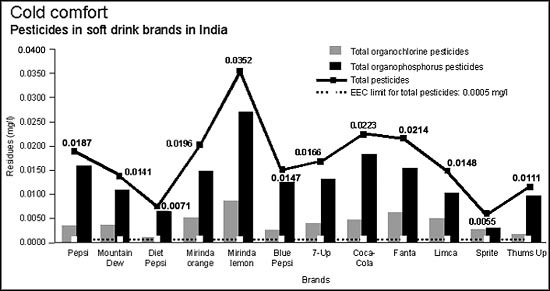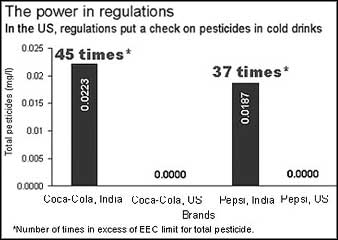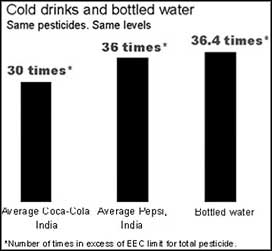HARD TRUTHS ABOUT SOFT DRINKS
Laboratory test finds pesticide residues in all cold drinks tested. Just as it
had in bottled water six months ago. How hollow are the quality claims of soft drink
multinationals? How can Indian consumers be saddled with sub-standard products? How can
companies get away with such bad practices?
New Delhi, August 5, 2003: After bottled water, it’s aerated water that has
plugged the purity test. In another exposť, Down To Earth has found that 12 major cold
drink brands sold in and around Delhi contain a deadly cocktail of pesticide residues. The
results are based on tests conducted by the Pollution Monitoring Laboratory (PML) of the
Centre for Science and Environment (CSE). In February this year, CSE had blasted the
bottled water industry’s claims of being ‘pure’ when its laboratory had
found pesticide residues in bottled water sold in Delhi and Mumbai.

This time, it analysed the contents of 12 cold drink brands sold in and around the
capital. They were tested for organochlorine and organophosphorus pesticides and synthetic
pyrethroids — all commonly used in India as insecticides.
The test results were as shocking as those of bottled water.
All samples contained residues of four extremely toxic pesticides and insecticides:
lindane, DDT, malathion and chlorpyrifos. In all samples, levels of pesticide residues far
exceeded the maximum residue limit for pesticides in water used as ‘food’, set
down by the European Economic Commission (EEC). Each sample had enough poison to cause
— in the long term — cancer, damage to the nervous and reproductive systems,
birth defects and severe disruption of the immune system.
What we found
- Market leaders Coca-Cola and Pepsi had almost similar concentrations of pesticide
residues. Total pesticides in all PepsiCo brands on an average were 0.0180 mg/l
(milligramme per litre), 36 times higher than the EEC limit for total pesticides (0.0005
mg/l). Total pesticides in all Coca-Cola brands on an average were 0.0150 mg/l, 30 times
higher than the EEC limit.
- While contaminants in the ‘Dil mange more’ Pepsi were 37 times higher than the
EEC limit, they exceeded the norms by 45 times in the ‘Thanda matlab Coca-Cola’
product.
- Mirinda Lemon topped the chart among all the tested brand samples, with a total
pesticide concentration of 0.0352 mg/l.

The cold drinks sector in India is a much bigger money-spinner than the bottled water
segment. In 2001, Indians consumed over 6,500 million bottles of cold drinks. Its growing
popularity means that children and teenagers, who glug these bottles, are drinking a toxic
potion.
PML also tested two soft drink brands sold in the US, to see if they contained
pesticides. They didn’t.
The question, therefore, is: how can apparently quality-conscious multinationals market
products unfit for human consumption?
CSE found that the regulations for the powerful and massive soft drinks industry are
much weaker, indeed non-existent, as compared to those for the bottled water industry. The
norms that exist to regulate the quality of cold drinks are a maze of meaningless
definitions. This "food" sector is virtually unregulated.
The Prevention of Food Adulteration (PFA) Act of 1954, or the Fruit Products Order
(FPO) of 1955 — both mandatory acts aimed at regulating the quality of contents in
beverages such as cold drinks — do not even provide any scope for regulating
pesticides in soft drinks. The FPO, under which the industry gets its licence to operate,
has standards for lead and arsenic that are 50 times higher than those allowed for the
bottled water industry.
What’s more, the sector is also exempted from the provisions of industrial
licensing under the Industries (Development and Regulation) Act, 1951. It gets a one-time
license to operate from the ministry of food processing industries; this license includes
a no-objection certificate from the local government as well as the state pollution
control board, and a water analysis report. There are no environmental impact assessments,
or siting regulations. The industry’s use of water, therefore, is not regulated.

It is clear that the regulations have been designed in total disregard for public
health. But what is unfortunate is that the global players — two giant corporations,
who swear by the principles of corporate responsibility and global standards — have
been caught in the act, taking advantage of the weak and nonsensical regulatory standards
in India. Or, may we say, by fixing the standards to compromise our health.
Visit: http://www.cseindia.org/html/cola-indepth/index.htm
To read the complete Down To Earth cover story; Download the complete CSE lab report;
View the press conference presentation; or to view this Press Release online, download
pictures, and e-mail it to friends
CONTACT: If you have questions, e-mail us at media@cseindia.org or call us on
9810098142

